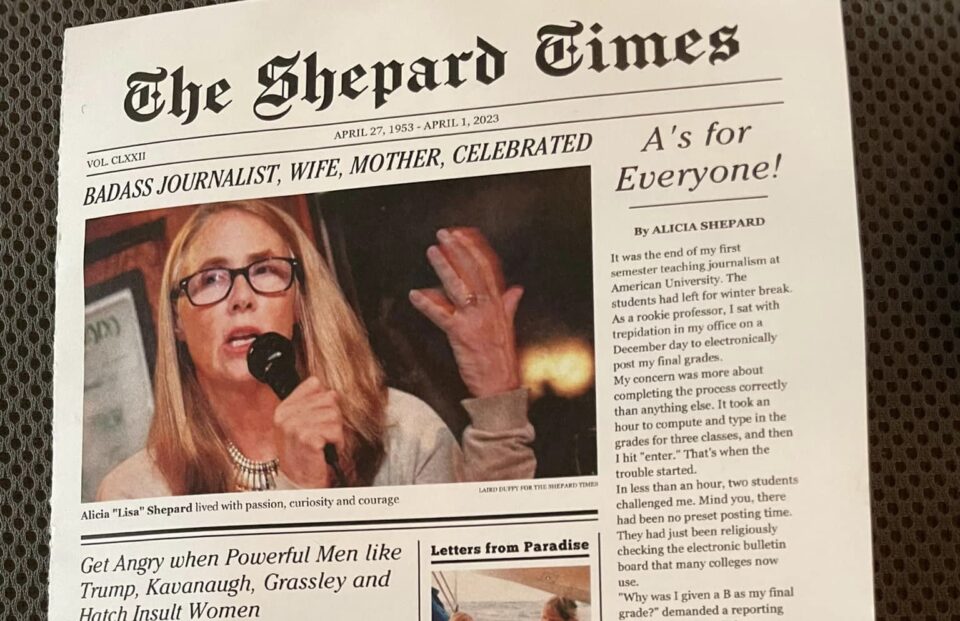Taking Risks Is ‘How We Live Life to the Fullest’
Michel Marriott, N.Y. Times Veteran, Dies at 69
Memorial service photos by Richard Prince and Susy Schultz
Support Journal-ismsDonations are tax-deductible.
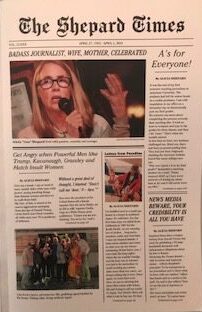
Taking Risks Is ‘How We Live Life to the Fullest’
An outdoor memorial service for Alicia “Lisa” Shepard, described in this space as a conscience of the news industry, advocate for diversity and friend of Journal-isms, took place Friday in the 400-acre Riverbend Park in Great Falls Va., outside Washington. The park abuts the Potomac River and, among other enticements, features a ramp for boaters.
The informal two-hour tribute focused on Shepard’s rich personal life. It closed with her friend Judy Belk, who is also president and CEO of the California Wellness Foundation, reading Shepard’s words about how she hoped to be remembered.
In those words, the journalist and media writer referred to joining her then-future husband, David Marsden, to Afghanistan, where he was working for the U.S. Agency for International Development. From 2014 to 2016, Shepard worked as managing editor for Impassion Afghanistan, a digital media agency, and as a press liaison for USAID.
Shepard, who was 69, also mentioned her son, Cutter Hodierne, a documentary filmmaker who told the group his mother “didn’t have time to be bored. Didn’t have time to fake it. She didn’t waste time. . . .” She demonstrated by her example that “doing what you absolutely love can be your job.” Both Shepard and Marsden had at separate times battled lung cancer, but only her husband was able to recover.

Shepard wrote:
“I want to be remembered as someone who grabbed life by the horns and lived it fully. I have spent my life seeking opportunities that have challenged me. I have taken risks that I am proud of. I am incredibly proud that Cutter’s dad and I quit our jobs and spent three years sailing through the South Pacific, essentially retiring while we were young. It was the right thing to do. I would like it to be an example. I am equally proud of making the decision to follow love to Afghanistan, and have the adventure of a life with David. It was the right thing to do. Taking risks, no matter what, [is] how we live life to the fullest, and how we can learn so much about ourselves.
“I want to be remembered as someone fun, lively, who loved life, and made wherever she was that much better and more fun because I was there. I have always taken seriously my mom’s words, that if you accept an invitation, you assume an obligation. So wherever I’ve gone, I’ve wanted to make my being there something others enjoyed.

“I want to be remembered as someone who loved strongly, lived fully and cared so much for the people in my life, and hope I’ve added something of value to each of their lives. I want to [be] remembered as someone people thought of as compassionate and empathetic, who gave as much of herself as she could, and was a good, if not excellent friend, as my friends have been to me.
“I want to be remembered as a good, loving mother to both Cutter and Lydia, and as an example of how to live. While Lydia is not my daughter biologically, she is as much a part of my life as any child. She and Cutter have brought endless joy to me. I want them to take smart risks, and not hesitate out of fear or convention.
“I want to be remembered for my giveback game, for trying to do what I could to make the news industry more diverse.
“I have tried to live my life as an example. No doubt, I have failed along the way. But throughout life, love for my family and for my friends guided me.”
Donations are being accepted at the Alicia “Lisa” Cobb Shepard Legacy Foundation, administered by the Arlington Community Foundation in Arlington, Va.
According to the website:
“The nonprofit recipients of this Foundation will have to excel in modeling one or more of the following Lisa-isms:
“(1) working to right a wrong;
“(2) supporting talented investigative journalists and media critics who are doing groundbreaking work;
“(3) chasing a good story which needs to be told even when it’s uncomfortable;
“(4) promoting diversity in the news industry;
“(5) providing resources and mentoring so those who are often forgotten can pursue their dreams.”
- RFK Human Rights: In Memoriam: Alicia Shepard (April 14)

Michel Marriott, N.Y. Times Veteran, Dies at 69
Michel Marriott, a veteran of The New York Times, The Washington Post and the Courier-Journal in Louisville, Ky., and an author who taught at New York’s Baruch College, died shortly after midnight Saturday after “a very long battle” with multiple myeloma, his wife, Angela Pruitt-Marriott, told Journal-isms.
Marriott had been diagnosed with the disease in 2018 and died at Mount Sinai Hospital in Manhattan, where he had been since March 11. He had been visited by a stream of family and friends, she said. The journalist turned 69 on March 8.
Marriott spent 19 years at the Times, starting in 1987 and ending in 2007, except for a year in the 1990s when he worked for Newsweek.
At the Times, Marriott covered several beats, including New York’s City Hall, national education, urban poverty and drug abuse, as well the racial and ethnic conflagrations of the Los Angeles and Miami riots.
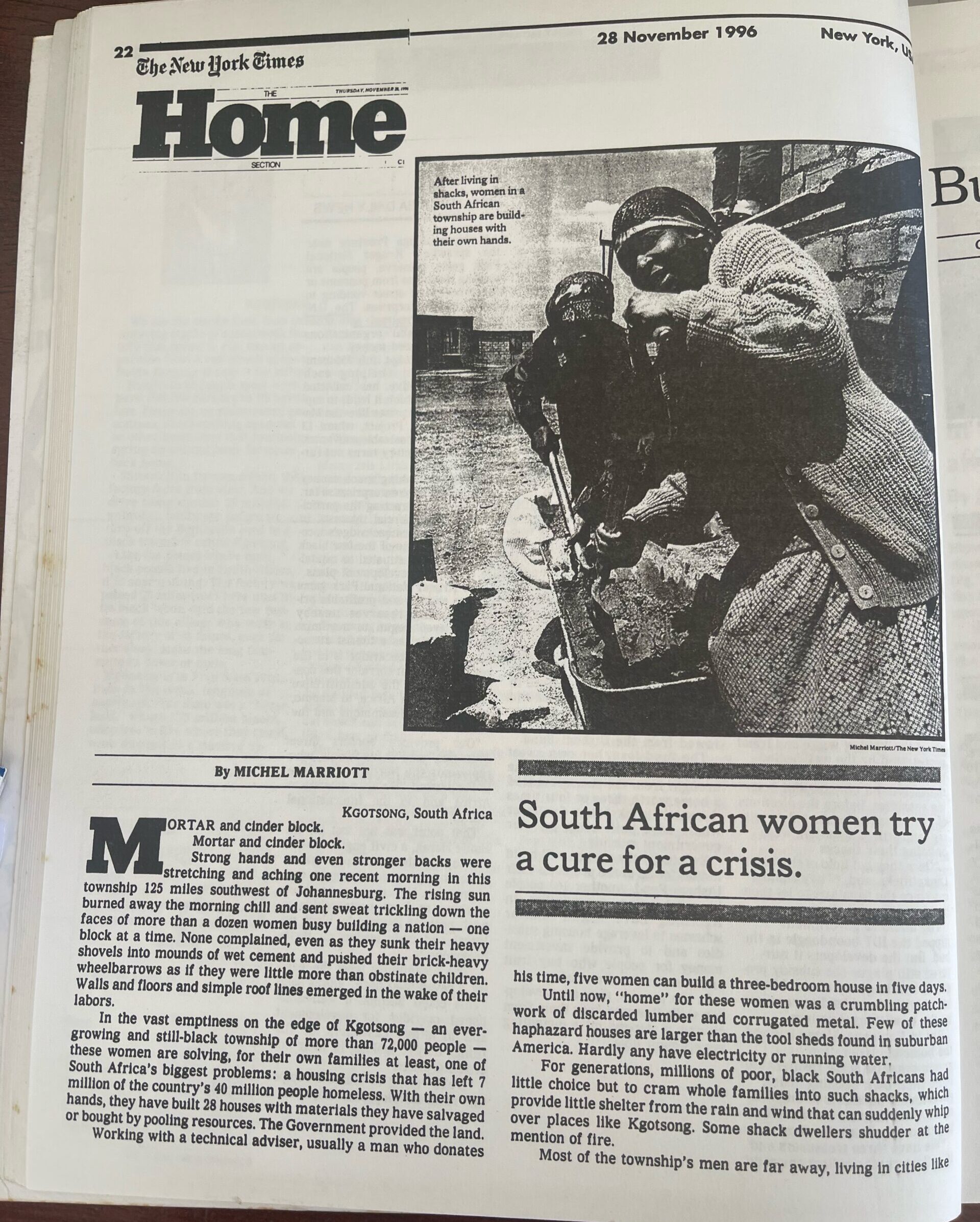 His interest in Africa took him on a reporting trip to the continent in 1996 (pictured, by Djibril Diallo) as part of a “Traveling Seminar for Journalists” organized by the United Nations Development Programme.
His interest in Africa took him on a reporting trip to the continent in 1996 (pictured, by Djibril Diallo) as part of a “Traveling Seminar for Journalists” organized by the United Nations Development Programme.
Beginning in 1998, Michel began to write exclusively about high-technology for the Times’ weekly technology section, “Circuits,” and the impact of consumer electronics on American culture.
His stories included Black cultural milestones and issues that remain hot-button today:
In 1991, long before current Florida Gov. Ron DeSantis led a sustained GOP attack on African American studies, Marriott wrote, “Not since black American college students began clamoring for African and black studies programs in the 1960’s has so much attention turned to history’s treatment of things and people African, and as in the 1960’s it has provoked debate inside and out of the academic community.”
Other pieces from that era included, “New York’s Worst Drug Sites: Persistent Markets of Death,” from 1989; in 1993, “Rap’s Embrace of ‘Nigger’ Fires Bitter Debate” and “For Minority Youths, 40 Ounces of Trouble,” and in 1992, the launch of Vibe magazine under the headline, “Hip-Hop’s Hostile Takeover.“
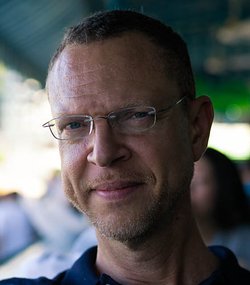 Veteran journalist Howard W. French (pictured), whose specialties have included Africa and Asia, used Marriott’s career as an example of issues facing Black journalists when he wrote for the Guardian in 2016 in a piece titled, “The enduring whiteness of the American media: What three decades in journalism has taught me about the persistence of racism in the US.”
Veteran journalist Howard W. French (pictured), whose specialties have included Africa and Asia, used Marriott’s career as an example of issues facing Black journalists when he wrote for the Guardian in 2016 in a piece titled, “The enduring whiteness of the American media: What three decades in journalism has taught me about the persistence of racism in the US.”
“Michel revealed to me that his strategy in those early years was to focus on subjects that he knew white peers would find unattractive – which frequently meant doing things that required going deep into black communities, often during moments of violence or trauma. ‘You would try to do a really good job, to really bring it, and hope that this would win you some recognition,’ he said. Michel was already an extraordinary journalist, and this strategy and his talents led him to cover racial tensions in New York, Miami and Los Angeles, where he reported on the 1992 riots with distinction.
“The limits of his political approach to race within the paper became apparent, though, when he successfully pushed to cover computers, games and consumer electronics during the technology boom of the 2000s. There was immediate pushback from his white colleagues, who claimed he had no background in tech and was not the right person for the job.
“A black man occupying this space did not fit preconceptions, any more than me heading to Tokyo did, and perhaps even less. Implicitly, it also meant depriving a white person of a coveted job covering a hot sector, and the ensuing resentment, much like the howls against supposed affirmative action that I had faced upon ascension to the foreign staff, laid bare the limits of liberal generosity in our profession.
“As a black reporter, one had little choice but to get used to lots of little insults; many of them came from unexpected places . . . .”
Baruch College wrote of Marriott in 2007, when he joined its faculty:
“A graduate of Morehead State University and Northwestern University (earning a B.A. and M.S. in print journalism, respectively), he began his career as a writer for the Chronicle-Tribune in Marion, Ind., leading to staff positions at The Courier-Journal in his native Louisville, Ky., The Washington Post, The Philadelphia Daily News and Newsweek magazine.
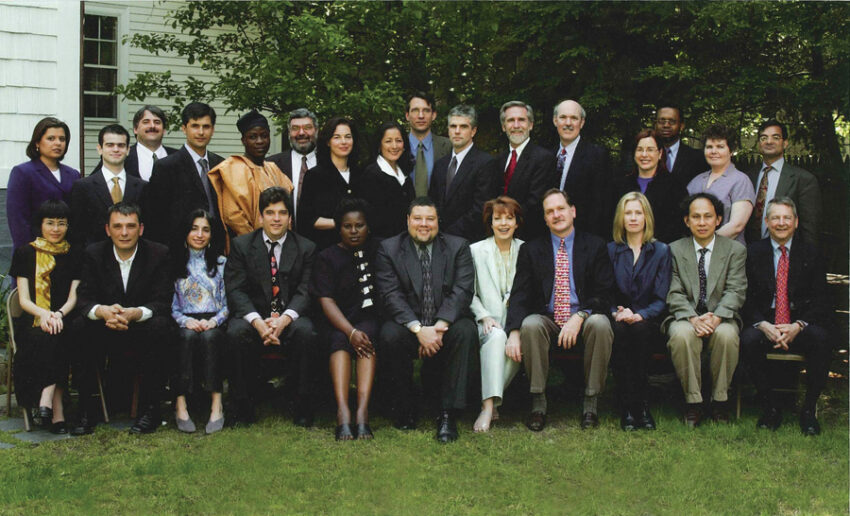
“Michel has also been a contributor to Essence magazine, Esquire, Vibe and African Voices. In 2001, he was awarded a Nieman Foundation fellowship, permitting him to study at Harvard University and the Massachusetts Institute of Technology during the academic year 2001-2002.
“Before joining Baruch College, Michel had been a longtime adjunct professor of journalism at City College and Columbia University, as well as a frequent instructor at the Antioch Writers’ Summer Workshop, the Antioch Writing Institution and the Frederick Douglass Center for the Creative Arts.”
More recently, Marriott taught writing workshops, published the novels “The Matrix Cultural Revolution: How Deep Does The Rabbit Hole Go?” (2003) and “The Skull Cage Key” (2004) and served on the board of Kweli Journal, which says that since its 2009 launch it “has grown into a multifaceted community organization that offers numerous writing, mentorship, and educational opportunities.”
In 2021, Marriott guest-edited an edition of African Voices, celebrating “the art of memoir writing with the celebration of ten rising storytellers.”
“He was an exceptional human being and an exceptional journalist,” said his longtime friend, fellow Courier-Journal alum Michael Days.
In addition to his wife, Marriott is survived by three children, Khari Marriott, Tarafa Vera Marriott and Olivia Marriott, and two brothers, Louis and Jon Marriott.
Services will not be immediate, Pruitt-Marriott said.
A First: NABJ Ousts Philly President
April 13, 2023
Ernest Owens Suspended for 5 Years
Claire Smith Wins Major Sports Journalism Honor
Social Policy Beat Finds Most Blacks, Hispanics
DEI Roles Show Higher Attrition Rates
CNN Disputes Story on Lemon’s Actions Toward Women
Most of ‘Global South’ Not in ‘World’ Coverage
Ethics Watchdog Wants DOJ to Investigate Thomas
Services Friday for Alicia Shepard, Industry Conscience
Injustice Highlighted in IRE’s 2022 Awards
Chicago Tribune Series: Justice Shockingly Delayed
A.P. Documents Troops Filming Boys’ Killings
NABJ Board Statement on Suspension of Ernest Owens
Short Takes: accused 6-year-old shooter; family members experiencing gun violence; Ann M. Simmons; Dana Canedy; Wendi C. Thomas; Ju-Don E. Marshall; race gap among retired journalists; student journalists as statehouse reporters; high school scholarship winner for diversity in journalism; Mark Trahant; April Ryan; Helen Ubinas’ pop-up Philly newsroom;
Online violence and journalists’ mental health; Latinos and census categories; jazz journalists’ “Jazz Hero” awards; Charlayne Hunter-Gault; Bryant Gumbel; broadcast reporter charged with DWI; Courtis Fuller; “Covert Mission to Solve a Mexican Journalist’s Murder”; Yvette Cabrera; Elon Musk and racism; “What It’s Like to Be a Journalist in the Sahel”; desperate needs for children in Sahel; environmental beat in Africa; journalists challenged on environment in Malawi.
Support Journal-ismsDonations are tax-deductible.

Ernest Owens Suspended for 5 Years
The National Association of Black Journalists has suspended Ernest Owens, president of the Philadelphia Association of Black Journalists, accusing him of violating its rules against disseminating disinformation and misinformation. It is the first time that such an action has been taken by the organization. Owens said he was told he had made NABJ history.
The suspension is for five years effective immediately, the NABJ board of directors confirmed Thursday.
It means that, as Owens said, “You are among other things barred from attending or participating in any NABJ members-only communication platforms, any NABJ members-only meetings, running for any . . . elected office, voting in any elections and holding any . . . leadership positions in task forces or being a member of task forces.”
Owens, who announced in December that the Philadelphia chapter had left the national organization, described the events leading to his “bombshell departure” in a podcast that recast the “misinformation” as “having opinions and being critical . . . it’s been a lot of this weaponization and fear tactics that have clamped down on free speech. . . . It’s ugly,” he said.
However, in its statement Thursday, the NABJ board said, “Any attempt to characterize such statements as ‘opinion’ does not negate the violative nature of such statements.” A committee investigating Owens’ conduct “provided Mr. Owens the opportunity to respond in writing to a dozen documented alleged violations as has been disclosed by Mr. Owens.”
Furthermore, “NABJ, as a journalist organization, encourages professional discourse and freedom of speech among its members, and the NABJ Code of Conduct contemplates such discourse. However, freedom of speech has long-held and acknowledged potential legal and organizational [consequences] in cases of slander, libel and dissemination of false or misleading information, particularly where such disinformation or misinformation is disseminated with a reckless disregard for the facts or the truth.
“NABJ continues to encourage constructive and critical dialog by and among its members.” Text of the statement at the end of this column.
In his podcast, Owens characterized the NABJ board’s action as the latest in a pattern of disparaging LGBTQ members.
Responding to a charge that Owens had initiated a “personal attack” on NABJ Executive Director Drew Berry, Owens said, “I’m just going to say that the way Drew has spoken to myself and other queer NABJ leaders over the years — I just have felt like it was always condescending; I always felt like it was passive-aggressive and sometimes I think it was microaggressive.
“That’s my personal experience. That’s my opinion. And, you know, I’ve had interactions with NABJ in the past when it came to support for the LGBTQ Task Force — when I was the chair .. . maybe some of those members will speak out. But there have been concerns that were raised about the ways the national organization engaged with the LGBTQ Task Force and LGBTQ members. And I am going to go so far as to say that in fact we had to have a meeting with the LGBTQ Task Force, the membership, to express the concerns about how people felt at the convention and the events.
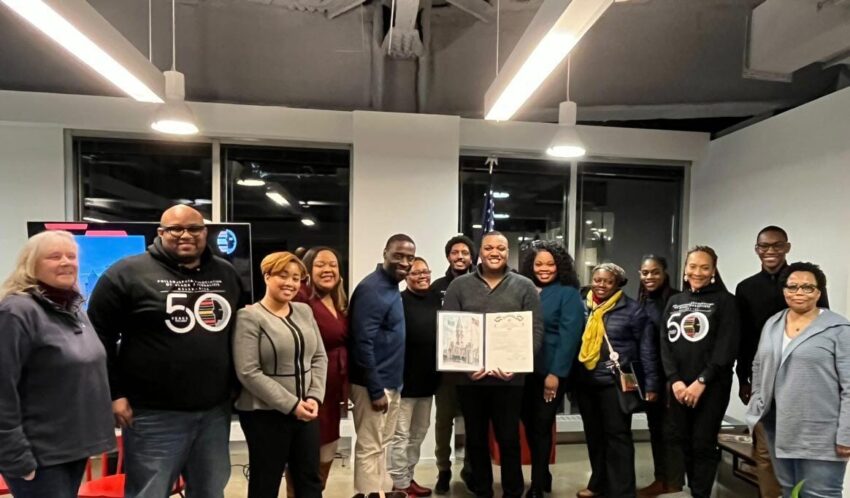
“There was one meeting when Dorothy Tucker,” NABJ president, “came on board. This was in 2020 after my election, because there were some people who felt like the rhetoric was homophobic from candidates” who support surrogates such as Walter Smith-Randolph, who defeated Owens for NABJ treasurer. The “surrogates” “had said something like, is this the kind of person you want to be on the board, and people pushed back, including myself, and said ‘what do you mean, is this the type of person? what type of person? What are you talking about, and what are you referring to?’
“And that led Dorothy and the organization to put out a statement supporting the LGBTQ community or addressing the concerns . . . raised. Because there was a history there. And I had spoken that history and other members shared it. So for them to act like the stuff that I’m saying is falling from the sky. There’s been history of homophobia in NABJ.”
The broadside against NABJ’s leadership was reminiscent of comments made in 2018 by then-executive director Sharon Toomer, in a leaked five-page letter criticizing the “degree of bad business culture” she asserted that the board of directors exemplified. She resigned three months later.
While Owens did not say the association had a “bad business culture,” the NABJ leadership said he had accused the association “of becoming a price gouging enterprise,” of becoming top-heavy with leaders and sponsors from the broadcast business as opposed to print, allowing such conflicts of interest as a candidate for office also becoming convention program chair, and permitting companies in the Career Fair “that I felt like, were not offering jobs, they were just trying to get information to spam us with information about the company in their businesses.”
In his podcast, Ernest Owens said he was told he made NABJ history.
Some of these sentiments were similar to those made by his predecessor as Philadelphia chapter president, Manuel McDonnell Smith, who challenged Tucker’s re-election bid in 2021 but lost, 531 votes to 111.
“So like, let me be very clear that like, I’m not somebody who just was talking s–t on Twitter. I was active in NABJ. I went to business meetings, I went to committee meetings, I was a committee chair of two to three committees for NABJ. I was winning ‘Emerging Journalist of the Year.” I was a chapter president, like, I’m somebody who
shows up and speaks up. So it’s not like this stuff had not already been discussed before.”
The charges were discussed by an ad hoc committee that included Maureen Bunyan, Joe Davidson and Allison Davis, all NABJ co-founders, veteran Paula Madison and NABJ parliamentarian Sia Nyorkor. “I’m going to be very honest with you, because this is my opinion,” Owens said.
“I believe that this ad hoc committee was stacked up against me because the people who are on this committee, some of these people have had previous personal gripes with me, the five people, not all of them. . . . all these people have strong relationships with the national president and the executive director. So they, you know, the national president gets to create the ad hoc committee, they get to appoint chairs and appoint what not.”
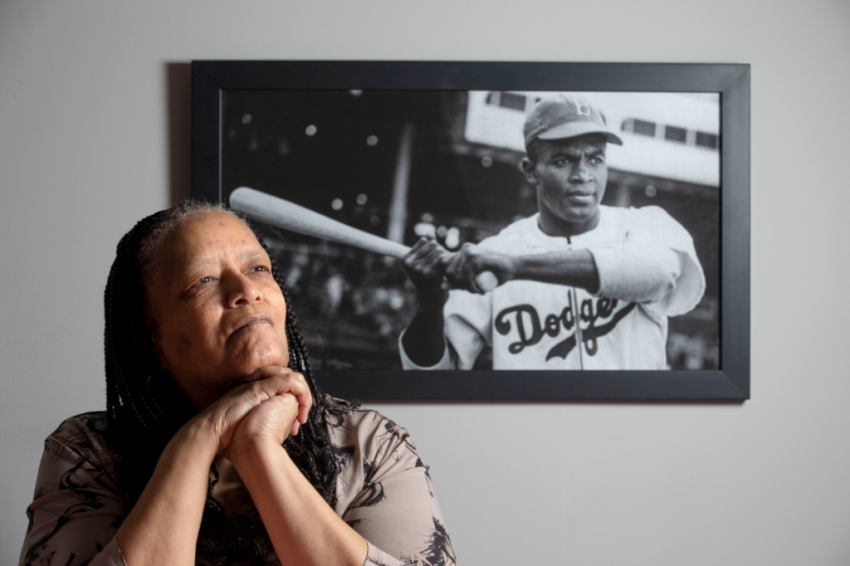
Claire Smith Wins Major Sports Journalism Honor
“Blazing trails is a way of life for Claire Smith. Some things never change,” Gary Potosky wrote April 6 for Associated Press Sports Editors.
“Smith is the winner of the 2023 Red Smith Award, regarded as the highest sports journalism honor in the United States.
“She is the first African American woman to win the award, given annually by the Associated Press Sports Editors to a writer or editor who has made major contributions to sports journalism. Smith is the sixth woman and fourth Black journalist to win the award.
“ ‘There always has to be a first before you hand the baton, and when I see how many women are taking on the task of being great sports writers and editors, women of color, and Latin American women … it’s just heartening,’ Smith said, upon learning from APSE President Jorge Rojas that she won the Red Smith Award. ‘I’m just so proud to be in their company. To be recognized and be in such great company … I certainly know I won’t be the last.’ . . . .”
The award marks the second consecutive year that a Black journalist has secured the award. Leon H. Carter of the Athletic, who won in 2022, Sam Lacy of the Baltimore Afro-American, who won in 1998 and Wendell Smith of the Chicago Herald-American, who won posthumously in 2014, were the other African Americans so honored in the award’s 42-year history.
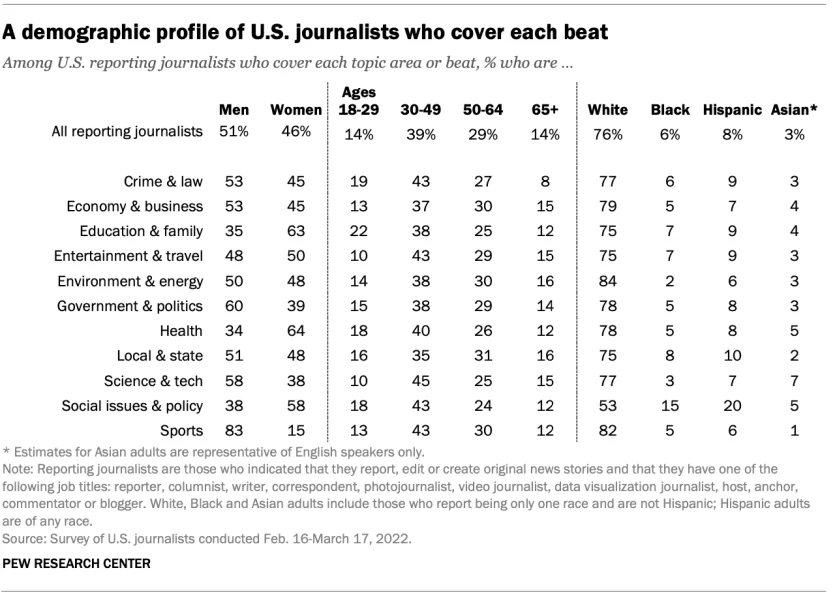
Social Policy Beat Finds Most Blacks, Hispanics
An analysis of a Pew Research Center survey of nearly 12,000 working U.S.-based journalists finds that Hispanic and Black journalists make up a greater portion of those who cover social issues and policy (20% and 15%, respectively) than any other beat studied, Emily Tomasik and Jeffrey Gottfried reported April 4 for Pew.
“White journalists make up about half (53%) of those who report on social issues and policy, but they make up large majorities of the other 10 beats studied, including 84% of those who cover environment and energy. Asian journalists account for no more than 7% of those who cover any of the 11 beats studied.
“Overall, 76% of all reporting journalists surveyed indicated that they are White, while 8% are Hispanic, 6% are Black and 3% are Asian. These figures align closely with previous research showing that a large portion of newsrooms’ employees are White, higher than the share of U.S. workers overall who are White. . . .”
DEI Roles Show Higher Attrition Rates
“Companies’ diversity efforts have been dragged into the culture wars lately — but corporate commitments to those initiatives already were declining,” Taylor Telford wrote April 1 for The Washington Post.
“Under public pressure after George Floyd’s murder in 2020, companies around the world spent an estimated $7.5 billion on diversity, equity and inclusion programs that year, making vocal commitments to diversity and equitable treatment within their ranks. But since then, firms have been backpedaling.
“A report from the workforce intelligence company Revelio Labs found that attrition rates for DEI roles have been outpacing those of non-DEI positions in more than 600 U.S. companies that laid off workers since late 2020 — and the attrition rates have increased in the past six months. . . .”
CNN Disputes Story on Lemon’s Actions Toward Women
 A 2,300-word “report from Variety alleges extensive inappropriate behavior by CNN host Don Lemon (pictured), including accusations that Lemon anonymously sent menacing texts to a colleague,” Isaac Schorr reported April 5 for Mediaite.
A 2,300-word “report from Variety alleges extensive inappropriate behavior by CNN host Don Lemon (pictured), including accusations that Lemon anonymously sent menacing texts to a colleague,” Isaac Schorr reported April 5 for Mediaite.
Schorr wrote, “the report includes a number of shocking claims made by former coworkers, with many centered around Lemon’s treatment of women. . . .”
“According to the report, in the late 2000s Lemon harbored resentment toward his CNN Live From cohost Kyra Phillips, especially after Phillips was chosen for an assignment in Iraq that he had hoped to be sent on. Two sources who spoke with Variety said that he reacted to the news first ‘by tearing up pictures and notes on top of and inside Phillips’ desk in the news pod they shared’ and later by threatening her.. . .”
“Phillips declined to comment on the allegations to Variety . . . A CNN spokesman issued the following statement on the allegations against Lemon:
“The Variety story provides no actual proof, and instead relies on anonymous sources and unsubstantiated claims from 10 to 15 years ago. CNN is unable to corroborate the alleged accounts.”
One who was on the record was Soledad O’Brien, who told Variety, “Don has long had a habit of saying idiotic and inaccurate things, so it sounds pretty on brand for him.” Another was Goldie Taylor, a former CNN consultant who appeared frequently as a guest on Lemon’s weekend show. She said she was blacklisted at the network for critiquing Lemon’s controversial comments.
“ ‘I am personally banned from a network b/c, ironically enough, I dared disagree w/ a black man publicly abt black life […] I don’t throw rocks and hide my hand. That network is @CNN and the anchor is @donlemon,’ she tweeted in 2016.”
Separately, at an inaugural media summit by the online outlet Semafor on Monday, CNN CEO Chris Licht said Lemon is a “lightning rod” after his years of hosting a prime time program “during an era where that was celebrated and encouraged,” but has “moved on” to host the network’s morning show, focusing more on reporting.
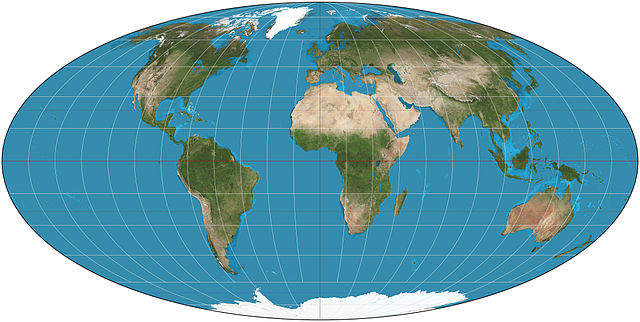
Most of ‘Global South’ Not in ‘World’ Coverage
In the anticipation of Donald J. Trump’s arrest last week, The New York Times and The Washington Post ran stories about world reaction to the impending event. But in echoes of the bad old days, when the Western perspective was the one that counted, only the usual suspects counted as the “world.”
Both stories left out much of what is now known as the “Global South.”
Wikipedia is not authoritative, but it says, “The Global South is a term generally used to identify countries in the regions of Latin America, Africa, Asia and Oceania. Most of humanity resides in the Global South.”
The Post story notes, “The rest of the world is watching, too,” but limits its comments to El Salvador, China, the Emirates, Britain and Israel, leaving out all of South America, all of Africa and the rest of the Far East that is not China.
Neither paper chose to explain its decision when Journal-isms asked spokespeople for comment.
 Coincidentally, the differences in the perspectives held in the Global South were starkly explained this month in a 6,400-word piece by Chelsea Ngoc Minh Nguyen (pictured), who has worked for the United Nations in Indonesia and Thailand focusing on economic development and trade policy affairs in Asia.
Coincidentally, the differences in the perspectives held in the Global South were starkly explained this month in a 6,400-word piece by Chelsea Ngoc Minh Nguyen (pictured), who has worked for the United Nations in Indonesia and Thailand focusing on economic development and trade policy affairs in Asia.
Nguyen sought to explain why some in the Global South do not see the Russian invasion of Ukraine through the same lens as those in the West. For example, Nguyen compares Russia’s treatment of Ukraine with Israel’s stance toward Palestinians. She asks why Vasyl Hamianin, Ukraine’s ambassador to Indonesia, would find himself “unable to recognize similar struggles for the same values of universal human dignity, equality, and fairness, unless they are spatially part of or peripheral to Europe as the epitome of civilization.” (The comparison of Ukrainians to Palestinians is hotly disputed).
In addition, Nguyen argues, the Western countries supporting Ukraine “are the very same unyielding creditors who often hold the majority ownership of their unsustainably high national debts. Recently, several countries in the global south (Egypt, Ghana, Lebanon, Pakistan, Sri Lanka and Zambia to name a few) have already or are about to default.
“This increasingly globally contagious macroeconomic situation is currently not only inviting debt restructurings on unfavorable terms but also further structural reforms within these countries, with the likelihood of deepening their existing social crises of rising extreme poverty, inequality, and stagnant development while still battling the multifold ramifications of the Covid-19 pandemic. It is this precarious context that the unwillingness and inability of the majority of countries in the global south to adopt economic sanctions against Russia must be understood by Ukraine’s wartime diplomacy in the global south.”
- Elena Aoun and Jeremy Dieudonne, Middle East Eye: Why Europe sees Ukrainians as victims, but Palestinians as ‘the other’ (March 6)
- Editorial, Jerusalem Post: The Palestinians are not like the Ukrainians (March 1)
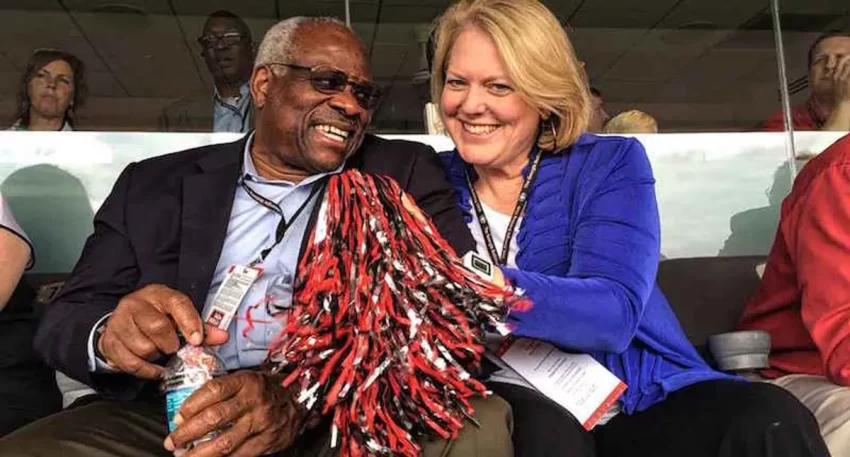
Ethics Watchdog Wants DOJ to Investigate Thomas
“A Washington ethics watchdog is calling for the Department of Justice to investigate Supreme Court Justice Clarence Thomas for failing to disclose luxury trips he received from a billionaire GOP megadonor,” Brett Murphy reported Wednesday for ProPublica.
“ ‘This high-profile ethics matter has historic implications far beyond one Supreme Court justice,’ attorneys for the nonpartisan Campaign Legal Center wrote in a detailed letter on Tuesday to the Judicial Conference, the principal policymaking body for federal courts. The Judicial Conference could trigger an investigation by referring the case to the Justice Department.”
Murphy also wrote, “ProPublica’s investigation last week revealed that Thomas has taken international cruises on conservative donor Harlan Crow’s superyacht, flown on Crow’s private jet and regularly vacationed at Crow’s private resort in the Adirondacks.
“If the Judicial Conference were to refer the case to the Justice Department, it could lead to a remarkable historical moment. One of the few instances of a federal investigation into a sitting Supreme Court justice occurred in 1969, when Justice Department officials signaled an inquiry into outside payments that Justice Abe Fortas had been accepting. Fortas eventually resigned. . . .”
Separately, “Fox News Sunday” commentator Juan Williams, who has acknowledged his long friendship with Thomas, said on the show Sunday, “There’s no evidence, say, of corruption. But, boy, this looks bad.”
The “integrity of the court is at stake here. And it — it has been for a while with Justice Thomas, who is a friend. So let’s put that out there. But I’m going to tell you something, I think that when you understand that he is palling around with people like Harlan Crow, these aren’t people who Sheldon Whitehouse, [D-R.I.] the senator, said this week, who have an interest in a case in the court, these are the people who make a business of the court. People like Leonard Leo of the Federalist Society, this is who he’s hanging out with . . . “
- Jamelle Bouie, New York TimesClarence Thomas Is as Free as Ever to Treat His Seat Like a Winning Lottery Ticket
- Mary C. Curtis with Justin Elliott, reporter at ProPublica, Slate: Clarence Thomas’s Friends in High Places: Who is Harlan Crow and why is he the justice’s vacation benefactor? (podcast)
- Justin Elliott, Joshua Kaplan and Alex Mierjeski, ProPublica: Billionaire Harlan Crow Bought Property From Clarence Thomas. The Justice Didn’t Disclose the Deal.
- Clarence Page, Chicago Tribune: Justice Clarence Thomas’ appearance of impropriety? We’ll be the judge
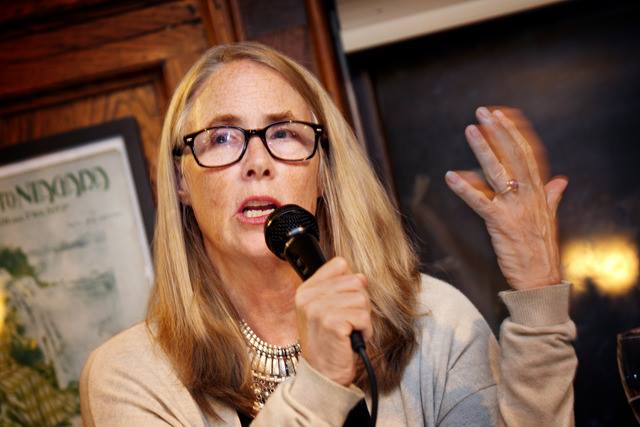
Services Friday for Alicia Shepard, Industry Conscience
A memorial service is scheduled Friday for Alicia Shepard, conscience of the news industry, advocate for diversity and friend of Journal-isms. She died on April 1 at her home in Arlington, Va. She was 69.
Her husband, David Marsden, said the cause was complications of lung cancer, Richard Sandomir reported Wednesday for The New York Times.
The Washington Association of Black Journalists noted Wednesday that Shepard “volunteered for more than a decade with WABJ’s Urban Journalism Workshop (UJW), an annual eight-week program for D.C. area high school students founded in 1986. In 2020, Shepard co-founded the UJW Angel Scholarship Fund with immediate past program coordinator and National Public Radio producer Trina Williams to provide annual financial support to program participants in college.”
The Times’ Sandomir also wrote, “In a diverse journalistic career, Ms. Shepard was a reporter, a university professor, the author of a book about the Watergate journalists Bob Woodward and Carl Bernstein, and, for nearly four years, NPR’s ombudsman, the listeners’ representative tasked with bringing transparency to the public radio network’s news-gathering practices.”
J Kyle Foster wrote for the Journalism and Women Symposium, known as JAWS, that Shepard “understood the need to secure the privacy and sanctity for her sources.
“In the past four years under treatment for Stage 4 lung cancer, she extended that professional grace to herself, choosing to keep her illness private.”
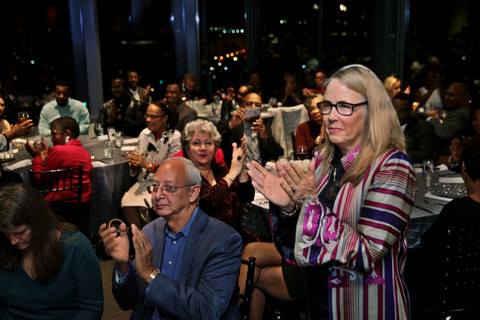 A regular at pre-pandemic Journal-isms Roundtables when they were held at local D.C. restaurants, Shepard wrote for Salon in 2016 under the headline, “Where’s the diversity in media? How newsrooms fail to reflect America and why it matters.”
A regular at pre-pandemic Journal-isms Roundtables when they were held at local D.C. restaurants, Shepard wrote for Salon in 2016 under the headline, “Where’s the diversity in media? How newsrooms fail to reflect America and why it matters.”
She also worked with the Power Shift Project, a national initiative of the Freedom Forum “to improve the quality and future of journalism by improving the diversity, equity and culture of news organizations.”
When Shepard returned to the States in 2016 after two years in Afghanistan, she briefed the Roundtable. She had emailed: “First year, I worked with Afghan journalists — training them and helping start a citizen journalists website. Second year, I was the senior press liaison for USAID based at the US Embassy, and hired to try to tell USAID’s story of how they are spending our money in Afghanistan. An impossible job.
“Women are treated like dirt there. It drove me crazy. But the one true legacy of US time in Afghanistan, is that US helped to establish a free press and they have one. Not strong like ours, but it exists.”
Shepard told the Roundtable, “Women can’t go out at night without a man accompanying her,” journalists included. The Afghan media need more women inside the newsrooms editing copy and the like. “It’s important to have a female voice.”
Overall, U.S. expenditures in the country are way too high, Shepard continued. “It’s like we give a 7-year-old $10,000 and say, ‘spend it wisely.’ Still, “even with 10,000 troops, Afghans would be terrified to have the U.S. leave. U.S. aid is very much needed.”
The memorial service will be held on Friday, April 14, at 2 p.m. at Riverbend Park, 8700 Potomac Hills St., Great Falls, Va., WABJ said. “Memorial contributions in Lisa’s honor may be made to The Alicia ‘Lisa’ Cobb Shepard Legacy Fund.”
Injustice Highlighted in IRE’s 2022 Awards
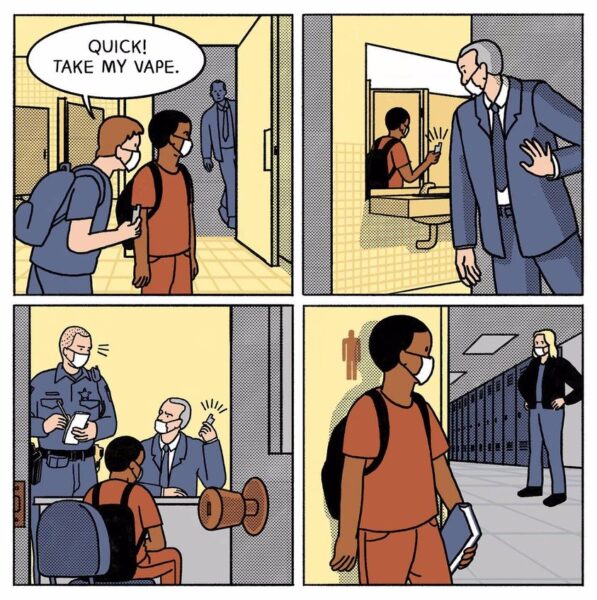
A story about “cyber slaves” in Cambodia; another about uneven enforcement of fines against students in Chicago; a report about embedding with migrants whose quests often ended tragically, and a follow-up on Southern University students’ deadly encounter with police in 1972 were among the winners in the 2022 IRE Awards of Investigative Reporters & Editors.
Video Division I:
“101 East — Forced to Scam: Cambodia’s Cyber Slaves,” Al Jazeera English, Mary Ann Jolley, David Boyle, Shaun Turton
“Judges’ comments: This is shocking reporting by a team that put themselves at extraordinary risk to get the story. ‘Cambodia’s Cyber Slaves’ exposed large-scale trafficking, torture, and enslavement inside the country’s massive scam industry, which is connected to the highest levels of government. This piece stood out because of the scope of the issues it raises related to human trafficking. The breadth of the reporting effort was also a key differentiator along with the widespread ramifications and far-reaching impact.”
Print/Online (written word) Division I:
“The Price Kids Pay,” Chicago Tribune and ProPublica, Jennifer Smith Richards, Chicago Tribune, Jodi S. Cohen, ProPublica, Armando L. Sanchez, Chicago Tribune
“Judges’ comments: Even though state law forbids schools from fining students for misbehavior, towns and cities across Illinois are levying monetary penalties for hallway fights, truancy, vaping and smoking, and other minor offenses. Worse, justice is uneven, Black students were twice as likely to be ticketed as their white peers. ProPublica and the Chicago Tribune documented these findings by creating a unique database built on hundreds of records requests and painstaking analysis, as well as shoe leather reporting and creative storytelling techniques.”
Audio Large:
“Death By Policy: Crisis in the Arizona Desert,” Futuro Media Group, Julieta Martinelli, Roxanne Scott, Maria Hinojosa, Peniley Ramirez, Mitra Bonshahi
“Judges’ comments: This story stood out for its on-the-ground reporting. This moving piece lived up to its title by showing how funneling migrants through environmentally dangerous areas led to their deaths. The team highlighted the border patrol’s attempt to take credit for the work that volunteers are doing. Embedding with the volunteer group in the desert was great reporting under physically difficult conditions.”
Student Large:
““For two families, a Southern University education meant everything. Then came tragedy.” LSU Manship News Service, Brittany Dunn, Drew Hawkins, Claire Sullivan, Shelly Kleinpeter, Annalise Vidrine, Adrian Dubose, Maria Pham, Allison Allsop, Alex Tirado
“Based on historical records and interviews, this is a sobering account of a deadly encounter between police and students during campus protests at Southern University in 1972, an encounter that left two young Black men dead and their families searching for answers. After 50 years, the questions and the stain remain. The students did an excellent job in recounting this painful event on their campus and its aftermath.”
- Nieman Foundation: ProPublica and the Chicago Tribune win the 2022 Worth Bingham Prize at Harvard for “The Price Kids Pay”
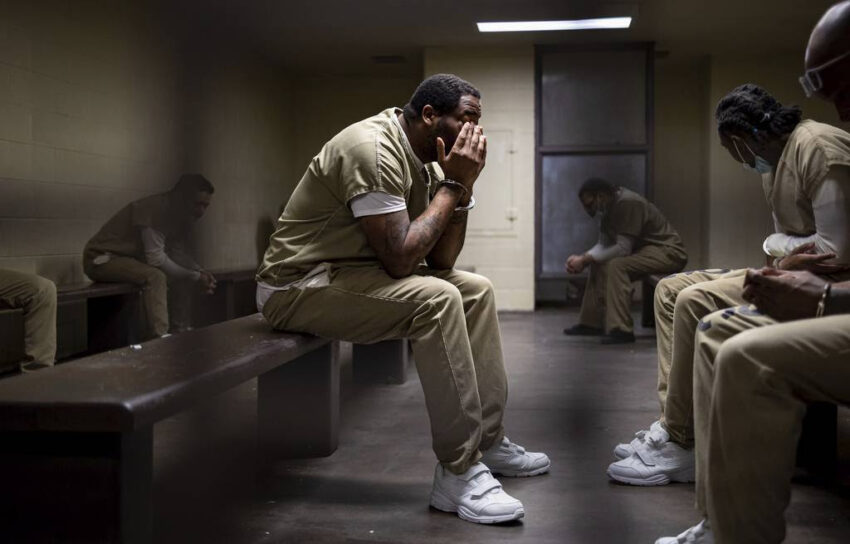
Chicago Tribune Series: Justice Shockingly Delayed
“In an unprecedented review of murder cases,” the Chicago Tribune “found Cook County’s courts are taking longer than ever to separate the guilty from the innocent — longer than courthouses in any city for which comparable data was available, including New York and Los Angeles. Delays here were growing before the pandemic, and have been getting worse since,” Joe Mahr and Megan Crepeau reported Sunday in the first installment of its “Stalled Justice” series.
“Advocates nationally aim for murder cases to take no more than a year. Cook County’s goal is a little more than two years. But it’s now taking more than four to complete most of the county’s murder cases, with some lasting up to a decade or more.
“ ‘I think what you’re discovering is a crisis,’ said Tom Geraghty, a Northwestern University professor emeritus who’s worked in and studied the county’s courts for decades. ‘I mean four years to wait for a trial is ridiculous. Two years is ridiculous.’
“Experts and advocates agree that justice shouldn’t be rushed, but in Cook County the pace of prosecution for murder cases has slowed to a near standstill.
“Murder defendants typically linger in jail longer than a presidential term. For those wrongfully accused, the process costs years with their families on the outside. Taxpayers are left to foot the bill for tens of millions a year in extra jail housing costs.
“And victims’ families must wait years for justice. . . .”
In a second installment Wednesday, Crepeau and Mahr wrote, “The Tribune conducted an in-depth review of more than two dozen randomly selected pending murder cases that had lasted four years or longer. Reporters pored over thousands of documents, observed dozens of hearings in those cases, and spoke with defendants, victims’ family members and attorneys.
“What emerged was a series of breakdowns so common they barely register with courthouse insiders. They are baked into the culture, accepted by most as part of doing business in a calcified system. . . .”
A video in Burkina Faso showing men in military fatigues walking among the bloodied bodies of boys surfaced on social media in mid-February. The Associated Press verified that the video was filmed inside a military base and found the family of one of the victims. (AP Video: Marshall Ritzel/Michael Biesecker)
A.P. Documents Troops Filming Boys’ Killings
“It was a walk 16-year-old Adama had done countless times, feeding the cows not far from his grandmother’s house in northern Burkina Faso,” Sam Mednick and Michael Biesecker reported April 3 for the Associated Press.
“But one day in mid-February, the teen who dreamed of becoming an imam didn’t come home.
“The next time his family saw him, it was in a harrowing cellphone video circulating on social media in the days after his disappearance.
“Adama lay alongside six other bloodied boys, their hands bound and most stripped to the waist.
“They were surrounded by about a dozen men, many in military fatigues, walking among the bodies, some taking video.
“Sprinting through the frame, one man came to a halt over Adama and slammed a rock onto his head.
“As blood streamed from the jagged wound, the man shooting the video chuckled.
“ ‘This one… was still alive,’ said the man, referring to Adama, whose last name is being withheld by The Associated Press out of concern for the safety of his family.
“ ‘Good-for-nothing! You don’t have anything to do but to kill people. We’ll kill you one after another.’
“Burkina Faso’s military has denied responsibility for the killings, which is a potential war crime under international law.
“A frame-by-frame analysis of the 83-second video by AP and an examination of satellite imagery shows the killings happened inside a military base about two kilometers (one and a quarter miles) northwest of Ouahigouya, a regional capital near where Adama lived.
“From their uniforms and vehicles, AP also determined troops in the video were members of Burkina Faso’s security forces, which until recently received military training and hardware from the United States and European Union.
“And through exclusive interviews with Adama’s mother and uncle, AP was also able to reconstruct his final hours.
“For seven years, the landlocked country has been wracked by violence linked to al-Qaida and the Islamic State group that has killed thousands, displaced about 10% of the country’s 20 million people and destabilized the nation.
Frustration at the government’s inability to stem the violence led to two coups last year by military juntas vowing to stamp out the insurgency. Yet little has changed, with Burkina Faso overtaking Afghanistan as the nation with the most deaths globally from extremist violence, according to a recent report by the Global Terrorism Index. . . .”
Short Takes
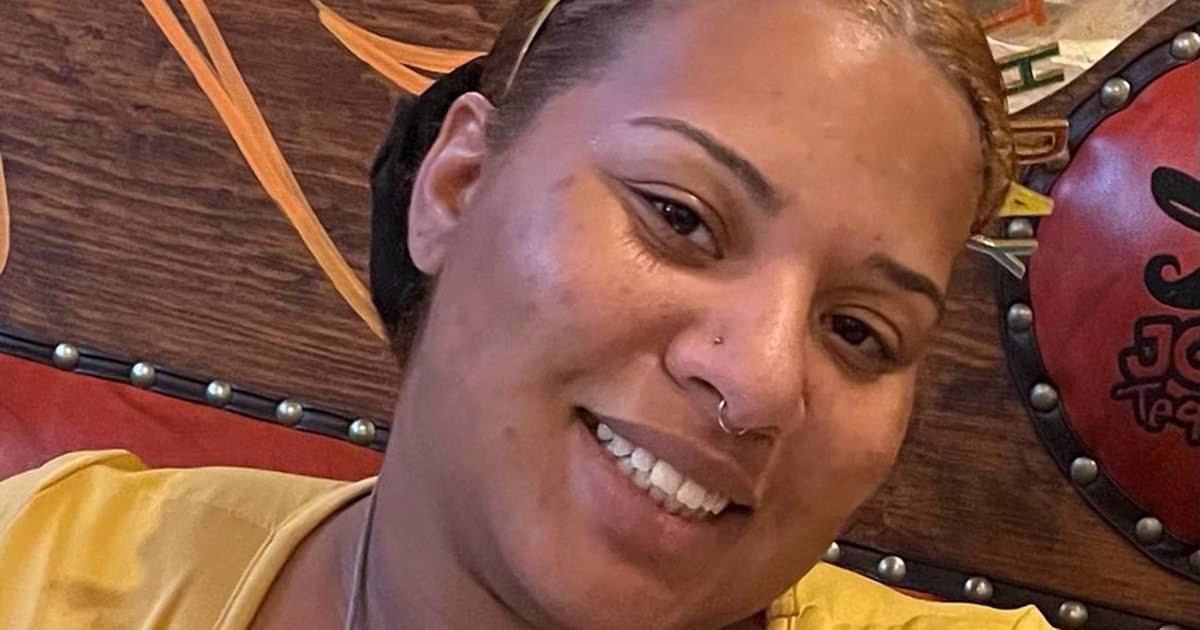 In January, this column noted that “The race of the 6-year-old accused of shooting his teacher in Newport News, Va., has not been made public, but the issue should have particular resonance in Black communities.” The rate of firearm-related deaths among Black youth is six times higher than white youth “and substantially higher than any other racial and ethnic group,” the Kaiser Family Foundation reported in October, analyzing national 2021 figures.” On Monday, the mother of the 6-year-old was arrested and charged with felony child neglect and a misdemeanor count of recklessly leaving a firearm so as to endanger a child. While the Daily Press in Newport News and WBRC-TV in Birmingham, Ala., did not identify the mother’s race in words, their photos showed her to be African American.
In January, this column noted that “The race of the 6-year-old accused of shooting his teacher in Newport News, Va., has not been made public, but the issue should have particular resonance in Black communities.” The rate of firearm-related deaths among Black youth is six times higher than white youth “and substantially higher than any other racial and ethnic group,” the Kaiser Family Foundation reported in October, analyzing national 2021 figures.” On Monday, the mother of the 6-year-old was arrested and charged with felony child neglect and a misdemeanor count of recklessly leaving a firearm so as to endanger a child. While the Daily Press in Newport News and WBRC-TV in Birmingham, Ala., did not identify the mother’s race in words, their photos showed her to be African American.
- “A majority of Americans say they or a family member has experienced gun violence, such as witnessing a shooting, being threatened by a person with a gun, or being shot, according to a sweeping new survey,” Liz Szabo reported Tuesday for Kaiser Family Foundation, which conducted the survey. “Nearly 1 in 5 respondents, including 34% of Black adults, 18% of Hispanic adults, and 17% of white adults, said a family member had been killed by a gun.“
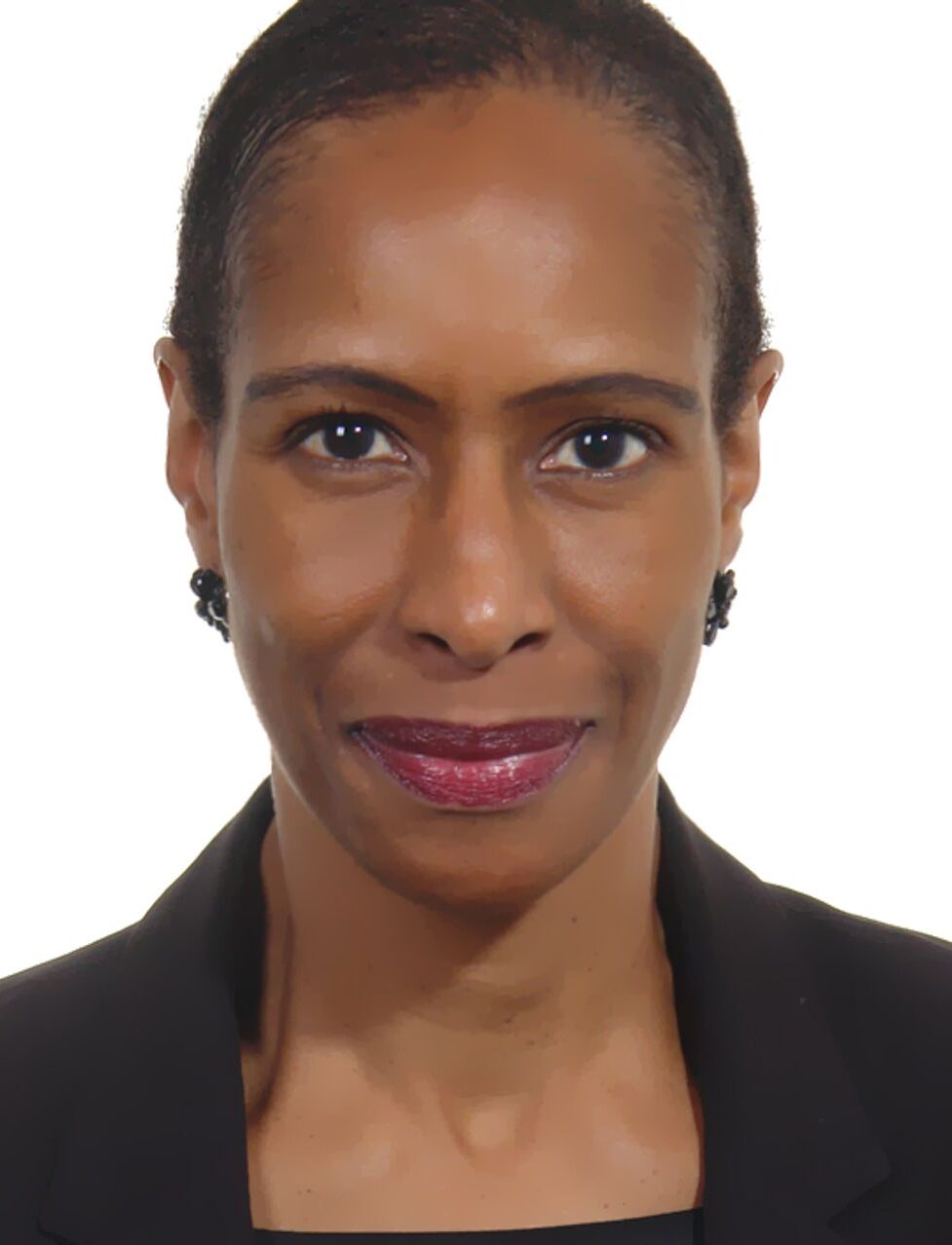 Ann M. Simons (pictured), the Wall Street Journal’s Moscow bureau chief, left the country after the arrest of Evan Gershkovich, the Journal reporter who is believed to be the first American reporter held on spying charges in Russia since the fall of the Soviet Union, Michael M. Grynbaum reported April 7 for The New York Times. “The exodus began roughly a year ago, in the first days of Russia’s invasion of Ukraine. Western news organizations, confronting a harsh crackdown on free speech by President Vladimir V. Putin, pulled correspondents from Moscow and suspended their news gathering in Russia. The risk to journalists, in a country where describing a war as a ‘war’ was suddenly a crime, was too great. . . . “
Ann M. Simons (pictured), the Wall Street Journal’s Moscow bureau chief, left the country after the arrest of Evan Gershkovich, the Journal reporter who is believed to be the first American reporter held on spying charges in Russia since the fall of the Soviet Union, Michael M. Grynbaum reported April 7 for The New York Times. “The exodus began roughly a year ago, in the first days of Russia’s invasion of Ukraine. Western news organizations, confronting a harsh crackdown on free speech by President Vladimir V. Putin, pulled correspondents from Moscow and suspended their news gathering in Russia. The risk to journalists, in a country where describing a war as a ‘war’ was suddenly a crime, was too great. . . . “
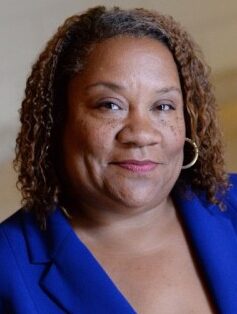 “Dana Canedy (pictured), the former publisher of Simon & Schuster, was named managing editor of Guardian U.S. on Tuesday, the latest executive to join the American edition of the British newspaper company,” Benjamin Mullin reported for The New York Times. “Ms. Canedy, 57, will be one of the highest-ranking executives in the Guardian U.S. newsroom, reporting to the editor in chief, Betsy Reed. Ms. Reed is herself a relatively recent hire, having joined the publication in September. . . .”
“Dana Canedy (pictured), the former publisher of Simon & Schuster, was named managing editor of Guardian U.S. on Tuesday, the latest executive to join the American edition of the British newspaper company,” Benjamin Mullin reported for The New York Times. “Ms. Canedy, 57, will be one of the highest-ranking executives in the Guardian U.S. newsroom, reporting to the editor in chief, Betsy Reed. Ms. Reed is herself a relatively recent hire, having joined the publication in September. . . .”
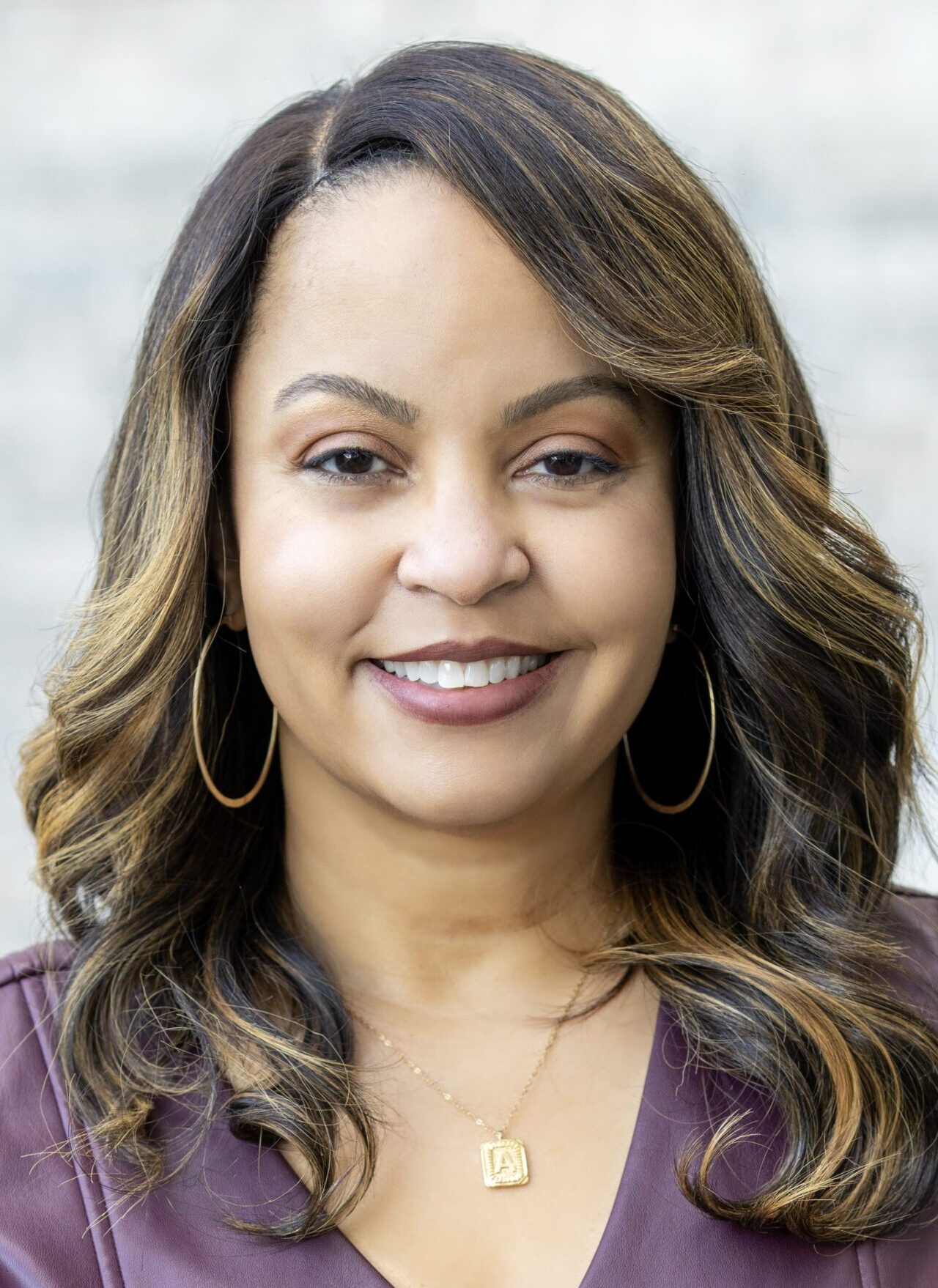 “Wendi C. Thomas (pictured), founding editor and publisher of MLK50: Justice Through Journalism, a nonprofit newsroom in Memphis, Tennessee, has been selected as winner of the 2023 I.F. Stone Medal for Journalistic Independence,” the Nieman Foundation, which bestows the award, announced Tuesday. “MLK50 focuses on poverty, power and a range of public policy issues that affect local residents. Since its founding in 2017, one year before the 50th anniversary of the assassination of Dr. Martin Luther King, Jr., it has provided indispensable community journalism and has told the stories of marginalized people too often ignored by established news media. . . .”
“Wendi C. Thomas (pictured), founding editor and publisher of MLK50: Justice Through Journalism, a nonprofit newsroom in Memphis, Tennessee, has been selected as winner of the 2023 I.F. Stone Medal for Journalistic Independence,” the Nieman Foundation, which bestows the award, announced Tuesday. “MLK50 focuses on poverty, power and a range of public policy issues that affect local residents. Since its founding in 2017, one year before the 50th anniversary of the assassination of Dr. Martin Luther King, Jr., it has provided indispensable community journalism and has told the stories of marginalized people too often ignored by established news media. . . .”
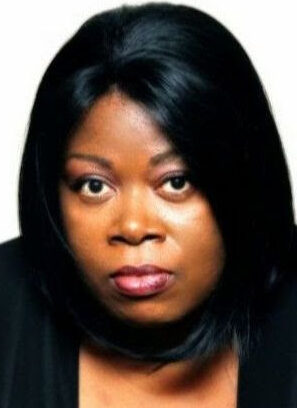 Ju-Don E. Marshall (pictured) has been named president and chief executive officer of public radio station WFAE-FM in Charlotte, N.C., the organization announced Tuesday. “A six-year veteran at WFAE, Marshall was most recently its executive vice president and chief content officer.” She “formerly held several roles with The Washington Post, most recently as Managing Editor of Washington Post Digital. . . .”
Ju-Don E. Marshall (pictured) has been named president and chief executive officer of public radio station WFAE-FM in Charlotte, N.C., the organization announced Tuesday. “A six-year veteran at WFAE, Marshall was most recently its executive vice president and chief content officer.” She “formerly held several roles with The Washington Post, most recently as Managing Editor of Washington Post Digital. . . .”
- “Retired journalists are stepping into news voids nationwide, launching local and regional media outlets or serving on their boards, mentoring young journalists, advocating for press freedoms, and continuing to gather and report information not otherwise being covered,” Jon Marcus reported April 3 for Nieman Reports. Marcus also wrote, “One glaring problem with the mentorship of younger journalists by older ones is that retirees are generally less diverse than the generation they mentor.” It’s a problem the Local News Advisory Team, a network of volunteer editors and coaches for understaffed newspapers, especially in rural areas, is “trying to address directly. Among the goals laid out in its business plan: ‘Figure out how to deal with our whiteness.’ ”
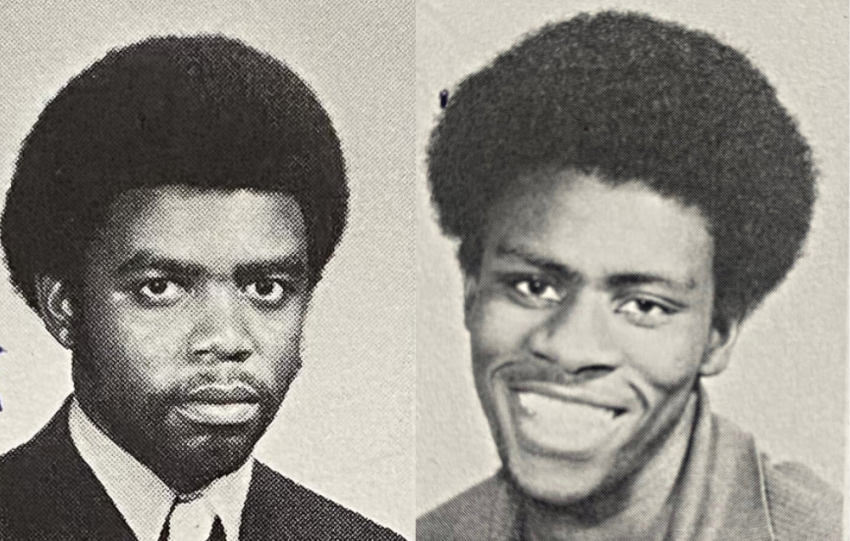
- As an example of student journalists filling roles once performed by the shrinking pool of statehouse reporters, Richard Watts wrote April 6 for the Conversation, “In Louisiana, 92 publications run stories from Louisiana State University’s statehouse reporting team. In a companion effort, called the Cold Case project, students dive deeply into racist murders from the state’s past. In late 2022, a series of stories about the police killing of two students at Southern University led to a public apology by Gov. John Bel Edwards.
 High school student Amaya Collier (pictured) of Austin, Texas, is winner of the 2023 Julie Schoo Scholarship for Diversity in Journalism, the National Press Club announced Wednesday. The award for graduating seniors totals as much as $20,000 over four years. “Collier impressed the judges with a broad range of work samples that demonstrated an eagerness to report from the field and talk to a number of people to get the story. As an editor for her school’s paper, The Shield, she’s reported on topics ranging from the ‘critical race theory’ bill, gender inequity, and immigrant food vendors,” the announcement said.
High school student Amaya Collier (pictured) of Austin, Texas, is winner of the 2023 Julie Schoo Scholarship for Diversity in Journalism, the National Press Club announced Wednesday. The award for graduating seniors totals as much as $20,000 over four years. “Collier impressed the judges with a broad range of work samples that demonstrated an eagerness to report from the field and talk to a number of people to get the story. As an editor for her school’s paper, The Shield, she’s reported on topics ranging from the ‘critical race theory’ bill, gender inequity, and immigrant food vendors,” the announcement said.
- Mark Trahant, Shoshone-Bannock, editor-at-large at Indian Country Today, is among six inductees to the 2023 National Native American Hall of Fame, the organization announced. Trahant, a former president of the Native American Journalists Association, is being honored for his reporting in Native American communities.
- “The Grio Washington Bureau Chief and White House Correspondent April Ryan has joined MSNBC as a contributor, the network announced Tuesday,” Mark Mwachiro reported Apri 4 for TV Newser. “Ryan will make appearances across MSNBC programming sharing her latest reporting and analysis from Washington, D.C. . . .”
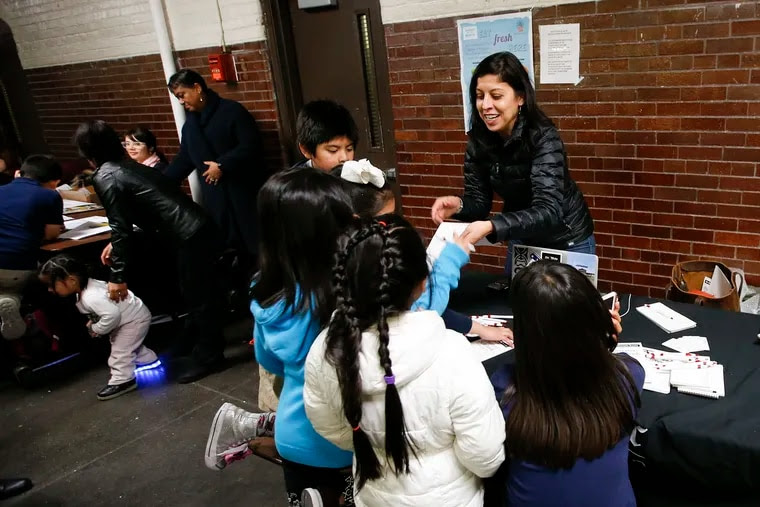
- “In the news business, showing up when calamity strikes is often the only way too many of my fellow journalists find ourselves in neighborhoods we might not otherwise take the time to visit,” Helen Ubiñas wrote April 5 for the Philadelphia Inquirer. She also wrote, “I’ve long believed that the best journalism is rooted in community, and a 2018 trip to a Journalism and Women Symposium conference only reinforced my aim to build even stronger relationships by just ‘popping up’ when there was no agenda, no strings, no pressing story . . .”. “
- “Online violence is often only considered a digital safety issue, but the impact of online abuse on journalists’ mental health has serious consequences for their lives, work and press freedom as a whole. This is particularly true for women and diverse journalists, who are disproportionately targeted by online attacks,” the American Press Institute said April 3. “When we created A Mental Health Guide for Journalists Facing Online Violence [PDF], we wanted to give journalists the tools to control a psychological emergency and recognize the symptoms of generalized anxiety, acute stress, PTSD and depression. The exercises in the guide help journalists assess the level of threat and psycho-emotional response they are having as a result of online abuse. . . .”
- “A large share of the U.S. Latino population doesn’t identify with any of the current racial categories in the census, according to new 2020 Census Bureau data that shows ‘major shifts’ in how Americans who identify as Hispanic report their race,” Nicole Acevedo reported March 31 for NBC News. “While almost 60% of the 54.6 million Americans who identified as Hispanic reported belonging to one racial group, such as white or Black, over a third (35.5%) of Latinos chose ‘Some Other Race’ alone. This category is currently not recognized as a race by the federal government. . . .”
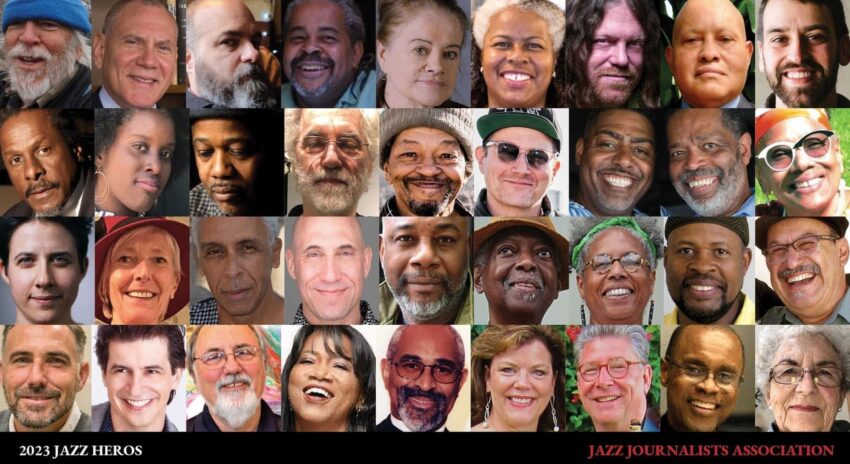
- The Jazz Journalists Association has announced its 2023 Jazz Heroes, “advocates who have had significant impact in their local communities. The ‘Jazz Hero’ awards, made annually on the basis of nominations from community members, are presented by their local fans and friends in conjunction with the JJA’s annual Jazz Awards honoring significant achievements in jazz music and journalism. . . .”
- Veteran journalist Charlayne Hunter-Gault is being honored for “Lifetime Achievement” in the 88th Annual Anisfield-Wolf Book Awards, “the only national juried prize for literature that confronts racism and explores diversity,” the organization announced April 3. Harvard professor and documentarian Henry Louis Gates leads off the announcement of the winners in this video.
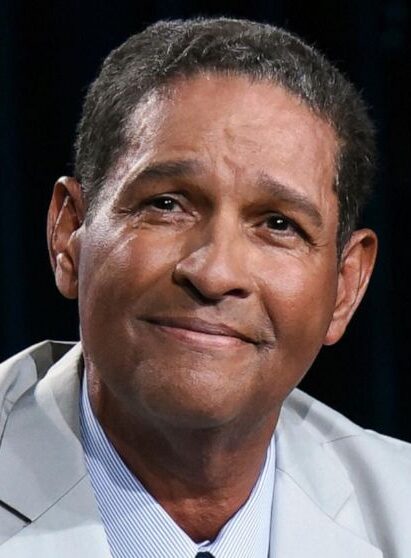 Bryant Gumbel (pictured) will be the first Black journalist to receive the Lifetime Achievement Sports Emmy award, Joe Reedy reported March 28 for the Associated Press. “The one story from ‘Real Sports,’ ” the monthly show Gumbel hosts, “that still resonates for Gumbel is the 2003 feature and interview with Marcus Dixon, who received a 10-year prison sentence for having sex with an underage girl,” Reedy wrote. “Georgia’s Supreme Court reversed the aggravated child molestation conviction but ruled that the statutory rape conviction would stand. Dixon had served the one-year sentence for that charge. Dixon was a Black 18-year-old and one of the top football prospects in the state of Georgia when a 15-year-old girl, who was white, accused him of rape. . . . ‘It was compelling story, but it basically saved and changed a young man’s life. It also righted a wrong, and that’s about all you can expect to do when you are in a position like we are in. You try to find something where you can do some good and help somebody else.’ ”
Bryant Gumbel (pictured) will be the first Black journalist to receive the Lifetime Achievement Sports Emmy award, Joe Reedy reported March 28 for the Associated Press. “The one story from ‘Real Sports,’ ” the monthly show Gumbel hosts, “that still resonates for Gumbel is the 2003 feature and interview with Marcus Dixon, who received a 10-year prison sentence for having sex with an underage girl,” Reedy wrote. “Georgia’s Supreme Court reversed the aggravated child molestation conviction but ruled that the statutory rape conviction would stand. Dixon had served the one-year sentence for that charge. Dixon was a Black 18-year-old and one of the top football prospects in the state of Georgia when a 15-year-old girl, who was white, accused him of rape. . . . ‘It was compelling story, but it basically saved and changed a young man’s life. It also righted a wrong, and that’s about all you can expect to do when you are in a position like we are in. You try to find something where you can do some good and help somebody else.’ ”
 “Raleigh-Durham ABC owned station WTVD has acknowledged that one of its reporters has been charged with driving while impaired,” Kevin Eck reported April 3 for TVSpy. “The station reported that Jamiese Price (pictured) was arrested Sunday morning by the North Carolina State Highway Patrol. The announcement was somewhat of a surprising move, given most stations won’t comment on personnel matters. Price has worked at the station since 2022. Before that, she worked at the Black News Channel. . . .”
“Raleigh-Durham ABC owned station WTVD has acknowledged that one of its reporters has been charged with driving while impaired,” Kevin Eck reported April 3 for TVSpy. “The station reported that Jamiese Price (pictured) was arrested Sunday morning by the North Carolina State Highway Patrol. The announcement was somewhat of a surprising move, given most stations won’t comment on personnel matters. Price has worked at the station since 2022. Before that, she worked at the Black News Channel. . . .”
 In Cincinnati, “Veteran anchor Courtis Fuller (pictured) returned this weekend to anchor WLWT-TV newscasts after nearly a four-month medical leave for cancer surgery,” John Kiesewetter reported April 2 for WVXU pubic radio.
In Cincinnati, “Veteran anchor Courtis Fuller (pictured) returned this weekend to anchor WLWT-TV newscasts after nearly a four-month medical leave for cancer surgery,” John Kiesewetter reported April 2 for WVXU pubic radio.
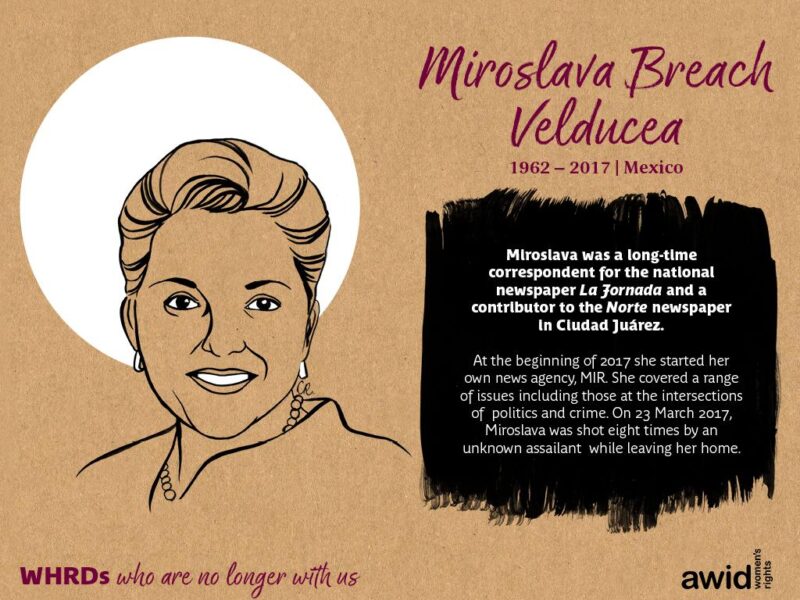
- “After the death of a reporter who investigated narcopolitics, her colleagues formed a secret collective to bring the killers to justice — and challenge a culture of impunity,” reads the summary of a piece by Melissa del Bosque in the April 17 edition of the New Yorker, “The Covert Mission to Solve a Mexican Journalist’s Murder.”
 Yvette Cabrera (pictured), senior reporter at the Center for Public Integrity and president of the National Association of Hispanic Journalists, “has won the 2023 Paul Tobenkin Memorial Award for her investigation of the devastating effects of uranium mining on the Navajo Nation,” Columbia Journalism School announced Tuesday. “Published with ICT, formerly Indian Country Today, Cabrera’s investigation laid bare generations of suffering caused by radioactive waste from hundreds of uranium mines the U.S. government used to make nuclear weapons during the Cold War. . . . The Paul Tobenkin Award, named in honor of the late New York Herald Tribune reporter, recognizes outstanding achievements in reporting on racial or religious hatred, intolerance, or discrimination in the United States. The award also carries a $1,500 honorarium.”
Yvette Cabrera (pictured), senior reporter at the Center for Public Integrity and president of the National Association of Hispanic Journalists, “has won the 2023 Paul Tobenkin Memorial Award for her investigation of the devastating effects of uranium mining on the Navajo Nation,” Columbia Journalism School announced Tuesday. “Published with ICT, formerly Indian Country Today, Cabrera’s investigation laid bare generations of suffering caused by radioactive waste from hundreds of uranium mines the U.S. government used to make nuclear weapons during the Cold War. . . . The Paul Tobenkin Award, named in honor of the late New York Herald Tribune reporter, recognizes outstanding achievements in reporting on racial or religious hatred, intolerance, or discrimination in the United States. The award also carries a $1,500 honorarium.”
 “Elon Musk’s (pictured) appearance at a major marketing conference next week has spooked the top advertising executives at some of America’s biggest companies,” Max Tani wrote April 7 for Semafor. “Musk is slated to speak on April 18 at the Possible conference from MMA Global, the premier digital marketing association. He’ll be interviewed by NBCU ad chief Linda Yaccarino and make the case that advertisers — who have abandoned Twitter because they don’t believe it’s a safe place to advertise — should return. But a private email thread among the organization’s board members, obtained by Semafor, suggests he will face a skeptical audience. Top advertisers, including McDonald’s and Colgate-Palmolive, are concerned that Musk’s comments about race and the platform’s openness to racist speech have rendered Twitter toxic. . . .”
“Elon Musk’s (pictured) appearance at a major marketing conference next week has spooked the top advertising executives at some of America’s biggest companies,” Max Tani wrote April 7 for Semafor. “Musk is slated to speak on April 18 at the Possible conference from MMA Global, the premier digital marketing association. He’ll be interviewed by NBCU ad chief Linda Yaccarino and make the case that advertisers — who have abandoned Twitter because they don’t believe it’s a safe place to advertise — should return. But a private email thread among the organization’s board members, obtained by Semafor, suggests he will face a skeptical audience. Top advertisers, including McDonald’s and Colgate-Palmolive, are concerned that Musk’s comments about race and the platform’s openness to racist speech have rendered Twitter toxic. . . .”

- “Five journalists have been killed in the Sahel in the past 10 years, while two others recently went missing,” Reporters Without Borders said April 3. “Hundreds of others have been threatened and can no longer work without putting their lives in danger. In the 40 pages of its latest report, What It’s Like to Be a Journalist in the Sahel, RSF reveals the extent to which the conditions for practicing journalism have worsened in this part of the world, and how it is becoming a ‘no-news zone’. To be a journalist in the Sahel means enduring the growing presence of radical armed groups who do not hesitate to kill reporters or kidnap them and use them as bargaining chips. . . .”
- “Ten million children in Burkina Faso, Mali and Niger are in dire need of humanitarian assistance as a result of the spiralling conflict,” Al Jazeera reported March 17. “In a report published on Friday, the United Nations children’s agency said nearly four million more children are at risk in neighbouring countries as hostilities between armed groups and national security forces spill across borders. . . .”
- “As more people become concerned about the effects of climate change on their lives, journalists in an otherwise struggling industry are becoming specialized in the environmental beat,” the Voice of America reported from South Africa on April 3. “But that wasn’t always the case, said Frederick Mugira, founder of Water Journalists Africa, the largest network of journalists on the continent reporting on water. . . .”
- In Malawi, “Energy Officer in the Ministry of Energy Christopher Kachinjika has challenged journalists to triple their efforts in raising environmental awareness that could help people realize the pressing need to take immediate action to stop harming the environment and start restoring the damage,” Watipaso Mzungu reported April 4 for Nyasa Times.. . . . [Community Energy Malawi] Executive Director Edgar Bayani said his organization is impressed with the number of households . . . which are adopting and embracing gas and other alternative energies for cooking away from charcoal. Bayani said charcoal use has caused a lot of damage to the environment; hence, the need to drop it now to save the remaining trees. . . .”
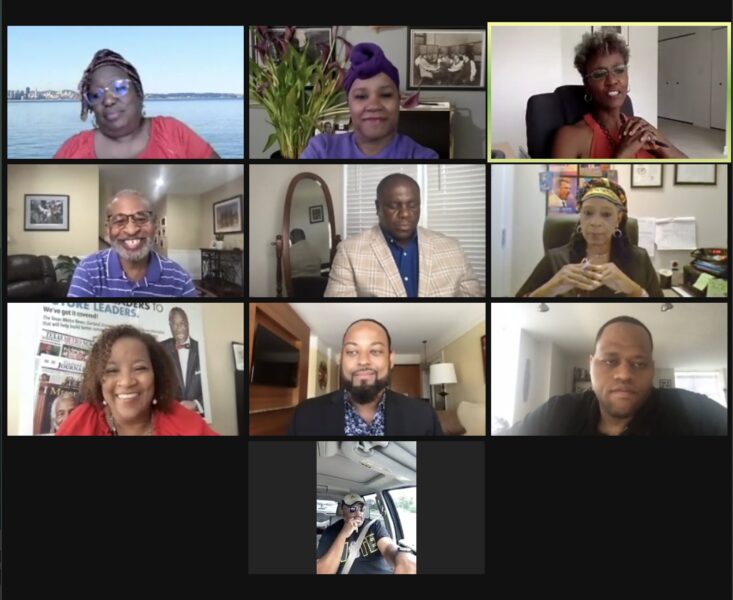
NABJ Board Statement on Suspension of Ernest Owens
April 13, 2023
The National Association of Black Journalists’ (NABJ’s) Board of Directors is obligated to adhere to, execute and enforce regulations under the NABJ Constitution and Operating Procedures.
Former NABJ member Ernest Owens publicly disclosed that his membership was recently suspended by NABJ for five years for violations of the NABJ Code of Conduct and Anti-Harassment Policy and the NABJ Code of Ethics. NABJ now confirms that action was taken by the NABJ Board of Directors following Mr. Owens’s disclosure of such action.
NABJ’s Ad Hoc Ethics Committee that conducted the investigation included several NABJ Founders: Maureen Bunyan, Joe Davidson and Allison Davis. It also included a long-standing media executive member of NABJ, Paula Madison, and NABJ Parliamentarian Sia Nyorkor. The committee examined what it concluded was an “unprecedented” and “sustained pattern” of violations of NABJ’s Code of Conduct and Code of Ethics by Mr. Owens.
The alleged violations consisted of statements and communications made personally and through various social media which the Committee determined constituted misinformation, disinformation and/or defamation regarding NABJ and several officers of NABJ – statements which were false or made with reckless disregard as to whether such statements were true or not. Any attempt to characterize such statements as “opinion” does not negate the violative nature of such statements. The Committee provided Mr. Owens the opportunity to respond in writing to a dozen documented alleged violations as has been disclosed by Mr. Owens.
Consistent with the NABJ Code of Conduct, after an investigation and substantiating the allegations with documentation and reading Mr. [Owens’] defense of the allegations, the Committee concluded its investigation with findings and recommendations to the NABJ Board of Directors. The recommendations included a suspension of membership for a term of five (5) years, again because of the unprecedented and sustained pattern of violations.
Per NABJ Operating Procedures, it is up to the NABJ Board of Directors to receive the Committee’s report, review the recommendations, conduct such additional investigation it desires, and decide what action if any should be taken. The NABJ Board determined that Mr. Owens had violated the NABJ Code of Conduct and NABJ Code of Ethics, and suspended Mr. Owens’ membership in NABJ for a period of five years.
NABJ, as a journalist organization, encourages professional discourse and freedom of speech among its members, and the NABJ Code of Conduct contemplates such discourse. However, freedom of speech has long-held and acknowledged potential legal and organizational [consequences] in cases of slander, libel and dissemination of false or misleading information, particularly where such disinformation or misinformation is disseminated with a reckless disregard for the facts or the truth. NABJ continues to encourage constructive and critical dialog by and among its members. These principles are reflected in the NABJ Code of Conduct.
To subscribe at no cost, please send an email to journal-isms+subscribe@groups.io and say who you are.
Facebook users: “Like” “Richard Prince’s Journal-isms” on Facebook.
Follow Richard Prince on Twitter @princeeditor
Richard Prince’s Journal-isms originates from Washington. It began in print before most of us knew what the internet was, and it would like to be referred to as a “column.” Any views expressed in the column are those of the person or organization quoted and not those of any other entity. Send tips, comments and concerns to Richard Prince at journal-isms+owner@
View previous columns (after Feb. 13, 2016).
View previous columns (before Feb. 13, 2016)
- Diversity’s Greatest Hits, 2018 (Jan. 4, 2019)
- Book Notes: Is Taking a Knee Really All That? (Dec. 20, 2018)
- Book Notes: Challenging ’45’ and Proudly Telling the Story (Dec. 18, 2018)
- Book Notes: Get Down With the Legends! (Dec. 11, 2018)
- Journalist Richard Prince w/Joe Madison (Sirius XM, April 18, 2018) (podcast)
- Richard Prince (journalist) (Wikipedia entry)
- February 2018 Podcast: Richard “Dick” Prince on the need for newsroom diversity (Gabriel Greschler, Student Press Law Center, Feb. 26, 2018)
- Diversity’s Greatest Hits, 2017 — Where Will They Take Us in the Year Ahead?
- Book Notes: Best Sellers, Uncovered Treasures, Overlooked History (Dec. 19, 2017)
- An advocate for diversity in the media is still pressing for representation, (Courtland Milloy, Washington Post, Nov. 28, 2017)
- Morgan Global Journalism Review: Journal-isms Journeys On (Aug. 31, 2017)
- Diversity’s Greatest Hits, 2016
- Book Notes: 16 Writers Dish About ‘Chelle,’ the First Lady
- Book Notes: From Coretta to Barack, and in Search of the Godfather
- Journal-isms’ Richard Prince Wants Your Ideas (FishbowlDC, Feb. 26, 2016)
- “JOURNAL-ISMS” IS LATEST TO BEAR BRUNT OF INDUSTRY’S ECONOMIC WOES (Feb. 19, 2016)
- Richard Prince with Charlayne Hunter-Gault, “PBS NewsHour,” “What stagnant diversity means for America’s newsrooms” (Dec. 15, 2015)
- Book Notes: Journalists Follow Their Passions
- Book Notes: Journalists Who Rocked Their World
- Book Notes: Hands Up! Read This!
- Book Notes: New Cosby Bio Looks Like a Best-Seller
- Journo-diversity advocate turns attention to Ezra Klein project (Erik Wemple, Washington Post, March 5, 2014)

